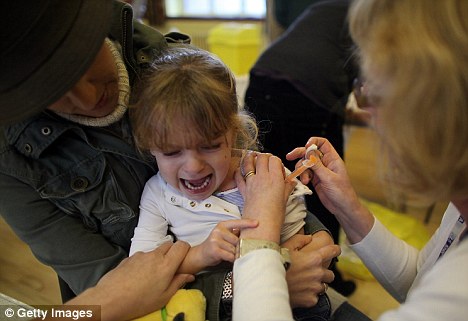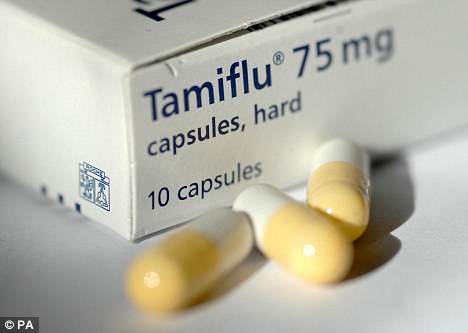Blood taken from 1,600 Britons after the 2009/10 H1N1 outbreak revealed that 44 per cent tested positive for the virus.
While some of these had been vaccinated or had caught a similar infection many years earlier, most had caught swine flu, say the Edinburgh University researchers.

Extrapolated across the country, this means that 20 times more people had swine flu than previously thought - even if it was so mild that many didn't realise it.
However, this doesn't mean that the outbreak, which killed almost 500 Britons when it first struck, was not serious.
Professor Mark Woolhouse, of the University's Centre for Infectious Diseases, said: 'This flu spread very quickly.
'There were about 20 times as many people found to have contracted the disease, as we first thought, which was surprising.
'It's true that many cases were mild but it does not change the number of people who died from the disease or who were in hospital.'
People living in the most deprived areas were almost twice as likely to have caught the bug, the journal PLoS ONE reports.
The professor said: 'It was pretty unexpected. I'm merely speculating here but I imagine it's to do with the size of the household being smaller, making viruses more likely to spread.'
The study of the antibodies in blood samples taken from people living in Glasgow and the west of Scotland, also revealed that millions of doses of vaccines may have been wasted
This is because the study revealed that almost half of those given the jab had already been infected and so were immune to the disease.
Professor Woolhouse said: 'Vaccinating them didn't do them any harm but for public health authorities that need to vaccinate people as quickly and effectively as possible, because stocks are limited and time is short, this is a wasted effort.'
He said that testing for antibodies during future outbreaks of flu or other infections could help better track the disease and help doctors decide who to vaccinate.

But Professor John Oxford, Britain's leading flu expert, questioned whether this would be practical.
He said: 'It is an interesting idea but the vaccine costs £5, whereas testing someone for antibodies would cost three or four times that, so the total cost would far exceed vaccination.
'And I don't think people would be too enthusiastic to line up and give blood to see if they needed a vaccine.'
Professor Oxford added that people shouldn't let the high rate of spread of the virus stop them from being vaccinated against flu in the future.
He said: 'Half of population hasn't had it and that means that half of the population is vulnerable and the virus could still come and get them.'
Swine flu claimed around 600 lives when it returned this winter and is expected to return alongside 'normal' seasonal flu viruses in years to come.



Reader Comments
to our Newsletter